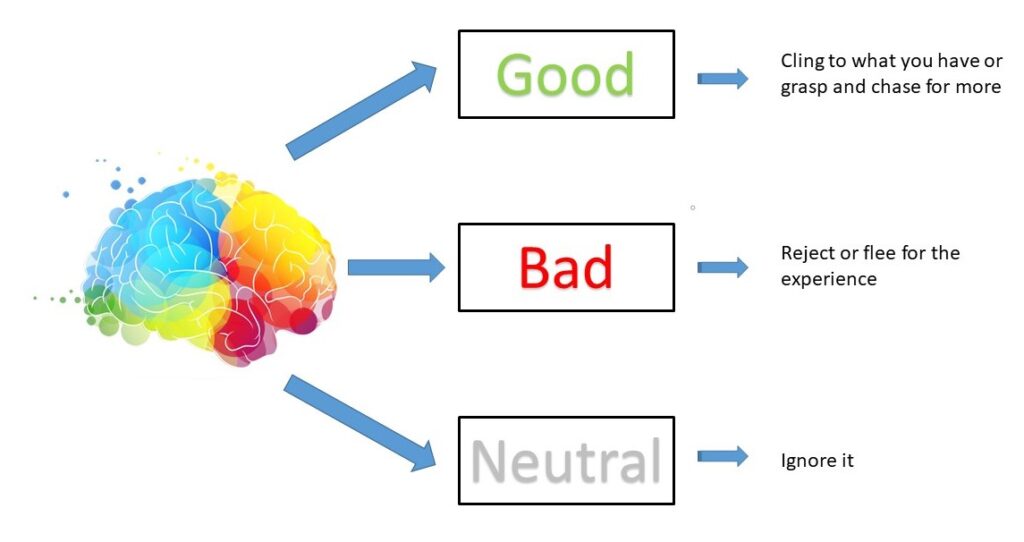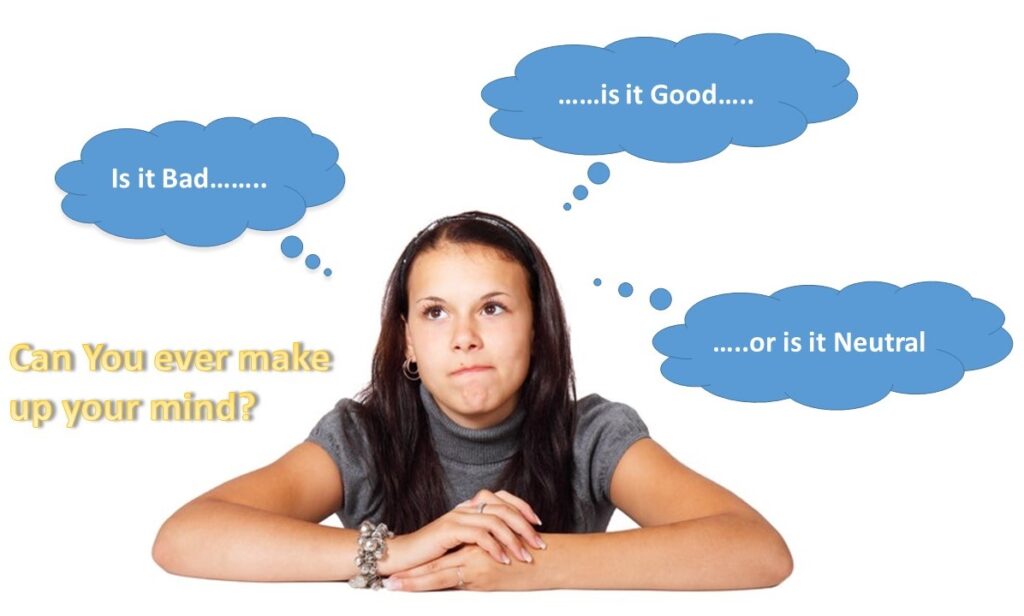Is this good bad or neutral? Most of the time, we go through our days judging our life experiences, the people we encounter, ourselves and our actions. So I asked myself this question – “Am I judgemental?” – “Could it be that being judgemental is our default setting?”
Personally, in today’s connected world many times I find myself caught blindly, as if by impulse, scurrying through and “liking” online comments, pages on the Internet, or evaluating places I visited or the experiences I had and people I met, either giving a thumbs up or “never again”, and how it could have been better. It seems to me that it comes naturally to us that we rate, categorise, evaluate and pose judgement on whatever we encounter “egocentrically” in relation to me – “how might this benefit me?”
For better or for worse it seems that being judgemental or posing judgement in regard to “how will this benefit me”, is something that has become somewhat ingrained in our way of thinking. We could actually say that from a psychosocial cultural perspective, our minds primary function might be that of being a “judging machine” (Kahneman, 2012).
Our mind is a judging machine
If we reflect, it seems that everything we experience is filtered, categorised, and evaluated in what we could call an automatic way. We see some things as “good”, so we grasp and cling to such good experiences, and for some of us, we might even fear and dread their end. Other things we judge as “bad”, so we try to avoid, resist, run away or hide from these. While whatever falls in between we judge as neutral, for the part ignoring such experiences as they do not trigger our threat or reward system (Gilbert & Choden, 2014).
Sometimes what we judge as good and attach to, might suddenly turn into a cascade of negative thoughts because of fear of change and that we might lose it or because of the simple fact of the transient nature of our experience (Hanh, 2003). Because of this, we can be too clingy or simply hesitate or fear to engage in any type of relationship or experience and instead we consciously chose to “be” in a passive detached mode of existence due to fear of loss or change.
Nothing wrong with judging
Unbecomingly there is nothing inherently wrong with judging what we encounter as good, neutral or bad. In fact, being able to judge and discriminate between situations objectively can be of great help in navigating the complexities of our daily lives. Also, an objective evaluation of situations we encounter can significantly help you understand what might resonate with you as a person and give you strength and purpose. Especially if you are on an internal journey of “finding meaning to one’s life”.
While also helping you understand what does not resonate with you and what might eat away at your strengths leaving you feeling drained and at times even helpless.
So where is the problem with being judgemental?
So in of in itself, it is not the act of judging and evaluating that is the problem. A problem arises when we identify with our judgements and get caught up in there narrative because It can take a significant amount of energy to evaluate every experience you encounter. Therefore you might end up mentally caught up in a constant loop of thought, evaluating and thinking about the same situations over and over again.
It is here that your judgements start taking over your mind that you actually become your judgements – you are “being judgemental” and here lies the problem.
Why is this a problem?
When left unchecked, this can be of great harm because when our judging mind is let lose it can be very taxing and controlling. Such that it is a well-known fact in psychology that an overtly judgemental mind. Especially a judgemental attitude towards one’s inner experience can be the result of mental illness like depression and anxiety or even uncontrollable outburst of anger (Barcaccia et al., 2019; Barlow, Durand, & Hoffman, 2017).
Moreover, an overtly judgemental mind can make/leave you feeling stuck in your life. As if you can never reach a target or move forward in life because in whatever situation you find yourself you would be on a red alert caught in a mode of existence of either chasing the “good” or fleeing from the “bad” while trying to ignore the “neutral”.

The marionette and the puppeteer
So let us reflect! If we are caught up in this mode of existence of merely being unaware of our automatic judgements and how these might be influencing our behaviour. You would actually be hostage to your own mind, which will take you along for a ride.
To explain and illustrate this I like to use the example of the marionette and the puppeteer.
So let’s STOP for a moment and take a mindful breath and realise that when we become trapped by our conditioned judgements. We can end up hostage to our minds reacting blindly to the situations we encounter. Similarly to how a marionette reacts to a puppeteer pulling its strings. With the puppeteer being what in meditation is called the “untrained mind” pulling on to the strings of our conditioned judgements with us reacting to its every pull of our strings.
This is where meditation, through the cultivation of mindfulness, presents an alternative to such a reactive mode of existence through the application of an all-encompassing non-judgemental awareness (Kornfield, 2008). Or more specifically through the cultivation of equanimity – a balanced engagement with life and all that is, let it be “good”, “bad” or “neutral” (Kornfield, 2012). However, this is the subject of part 2 on what it is to be non-judgemental?
References
Barcaccia, B., Baiocco, R., Pozza, A., Pallini, S., Mancini, F., & Salvati, M. (2019). The more you judge the worse you feel. A judgemental attitude towards one’s inner experience predicts depression and anxiety. Personality and Individual Differences, 138, 33-39. doi:10.1016/j.paid.2018.09.012
Barlow, D. H., Durand, V. M., & Hoffman, S. G. (2017). Abnormal psychology: An integrative approach (8 ed.). Mason, OH: Cengage Learning Custom Publishing.
Gilbert, P., & Choden. (2014). Mindful compassion. Oakland, CA: New Harbinger Publications.
Hanh, T. N. (2003). No death, no fear. New York, NY: Riverhead Books.
Kahneman, D. (2012). Thinking, fast and slow. London: Penguin Books Ltd.
Kornfield, J. (2008). The wise heart: A guide to the universal teachings of Buddhist psychology [epub]. United States: Bantam.
Kornfield, J. (2012). Bringing home the Dharma. Boston, MA: Shambala Publications Inc.


Definitely judging is in our default setting, the biggest set back would be if your judgement gave bad results like thinking someone is kind because of the way they talk to you only to later get punished by their hidden bad intentions making wish you hadn’t judged a book by its cover
You could make the argument that judging is definitely our default setting psychologically through an evaluation of perspective.
Pingback: Why Are We SO Judgemental?